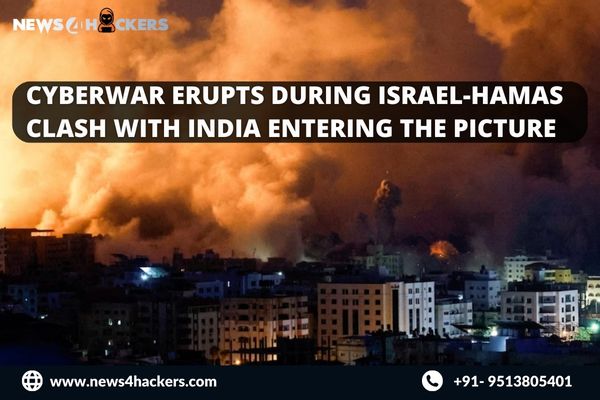Cyberwar Erupts During Israel-Hamas Clash With India Entering The Picture

Cyberwar Erupts During Israel-Hamas Clash With India Entering The Picture
In the midst of the continuous confrontation between Israel and the Palestinian group Hamas, a concurrent cyber conflict has emerged, introducing unforeseen complexities and developments. As the situation intensifies in the field, cyber assailants affiliated with different factions have initiated a sequence of cyber assaults, resulting in increased susceptibility for both nations. In addition to the existing digital war, a group supporting the interests of India has become involved, so introducing an additional level of intricacy.
Hamas Launches A Ground Attack
On the day of Saturday, a militant group known as Hamas initiated a terrestrial assault on the nation of Israel, supported by an incessant rain of missiles. The violent attack led to numerous injuries and the capture of an estimated 900 individuals, among them 73 Israeli military personnel. Surprisingly, a number of individuals have been subjected to hostage-taking as the scenario continues to evolve.
Cyber Chaos Infects the Jerusalem Post and Red Alert App
The Jerusalem Post, a well-known media organization headquartered in Israel, had a series of cyberattacks on October 8th. These attacks resulted in a website breakdown, rendering it unreachable from many places. The responsibility for the attack was claimed by a hacking organization known as Anonymous Sudan.
In a recent episode of concern, the Red Alert phone app system, which serves as a crucial mechanism for delivering immediate alerts during instances of rocket and missile assaults in Israel, has reportedly encountered a targeting attempt by a hacktivist collective identified as Anon Ghost.
Coordinated Cyber Operations: OpIsrael and OpsRise
Amidst the ongoing physical conflict, there has been a notable increase in activity within the cyber domain. The online collective “Ghost of Palestine,” which advocates for the Palestinian cause, launched a substantial cyber operation called #OpIsrael, aimed at mobilizing hackers from around the globe. The objective of the group is to focus on the cyber infrastructure of Israel and enhance the nation’s cyber resilience.
In addition, a hacker alliance with pro-Palestinian sentiments, comprising the groups “Ghost Clan” and “Black Shield Crew MY,” has published a cautionary statement indicating an imminent cyber operation against Israel referred to as “OpsRise.” The aforementioned occurrences underscore the intensifying digital hostilities within the enduring Israel-Palestine dispute, as several factions of hackers partake in acts of cyber warfare.
Collaboration between Russian Hacking Groups
According to the Twitter account @Cyberknow20, a total of 35 hacker organizations with pro-Palestine affiliations have continuously directed their activities toward targets within Israel. Of particular concern is the collaborative effort of two hacking entities, namely Anonymous Sudan and Killnet, both of whom possess pro-Russian affiliations. This partnership is specifically focused on targeting Israel’s cyber infrastructure.
Pro-Palestine Hacker Groups Target Governments and Websites
Pro-Palestine hacking organizations have engaged in a series of cyberattacks, exhibiting a systematic approach, with the primary objective of targeting various Israeli government websites. One of the noteworthy occurrences involves the assertion made by the Garnesia Team, who took credit for launching attacks on various official websites, such as the Municipality of Jerusalem and the National Insurance Institute. The ACEH Hackers Group gained recognition for its deliberate targeting of multiple Israeli websites, such as Cello, USHOPS, and CASTRO.
The focus of Team Herox Hackers Group was directed on the website of “The Occupation Magazine.” In the meanwhile, the Ganosec Team effectively carried out an offensive maneuver resulting in the temporary disruption of the Israeli Security Agency’s website.
According to cybersecurity analyst @FalconFeedsio, the website of the Otzma Yehudit Political party in Israel was targeted by the KEP Team, as claimed by the latter in a distinct occurrence.
A Pro-India Group Joins the Cyber Battle
In an unexpected turn of events, the “Indian Cyber Force,” a hacking group supportive of India, has emerged as a prominent participant within the hacktivist community advocating for Israel. The perpetrators have effectively executed cyberattacks on websites affiliated with the Palestinian region, resulting in significant consequences for several targets, including the official website of Hamas and the Palestine National Bank website.
In light of these incidents, hacker collectives supportive of the Palestinian cause have responded by launching Distributed Denial of Service (DDoS) attacks against the websites of the Delhi government. This development underscores the intensifying cyber hostilities associated with the Israel-Palestine conflict. Nevertheless, as of Monday, it was seen that the website of the Delhi government looked to be operating without any technical issues.
The Changing Characteristics of Cyber Conflicts
These occurrences collectively highlight the fluid and developing characteristics of conflicts within the digital domain. The user emphasizes the significant significance of cybersecurity inside present-day geopolitical conflicts, wherein hacks can yield tangible ramifications. As the ongoing situation unfolds, both nations are confronted with the complexities of safeguarding their digital domains while simultaneously handling the wider war on the physical front.
About The Author:
Yogesh Naager is a content marketer who specializes in the cybersecurity and B2B space. Besides writing for the News4Hackers blog, he’s also written for brands including CollegeDunia, Utsav Fashion, and NASSCOM. Naager entered the field of content in an unusual way. He began his career as an insurance sales executive, where he developed an interest in simplifying difficult concepts. He also combines this interest with a love of narrative, which makes him a good writer in the cybersecurity field. In the bottom line, he frequently writes for Craw Security.
Read More News Here






